Climate change, a pressing 21st-century global issue, manifests through rising sea levels, extreme weather events, glacier melting, and the overarching impact of global warming, making renewable energy, sustainable heating, and sustainable cooling solutions like solar-powered air conditioning a top priority and power source of the future.
According to Global Change data, the average air temperature in the United States has increased by 1.8°F (1°C) over the last 115 years. If we look at the infographic, we can see that with each passing year, the temperature in America continues to rise.
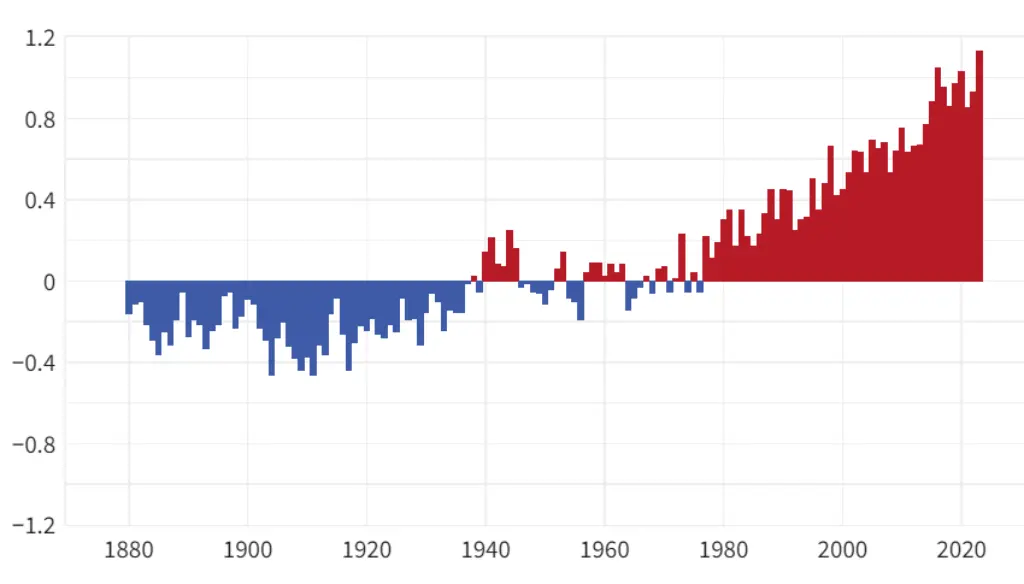
Source: NOAA Climate.gov
The rising temperature is observed in all regions of the United States. You can see the dynamics of changes for each state below. Based on research, the EPA claims that temperatures have risen the most in the North, West, and Alaska.
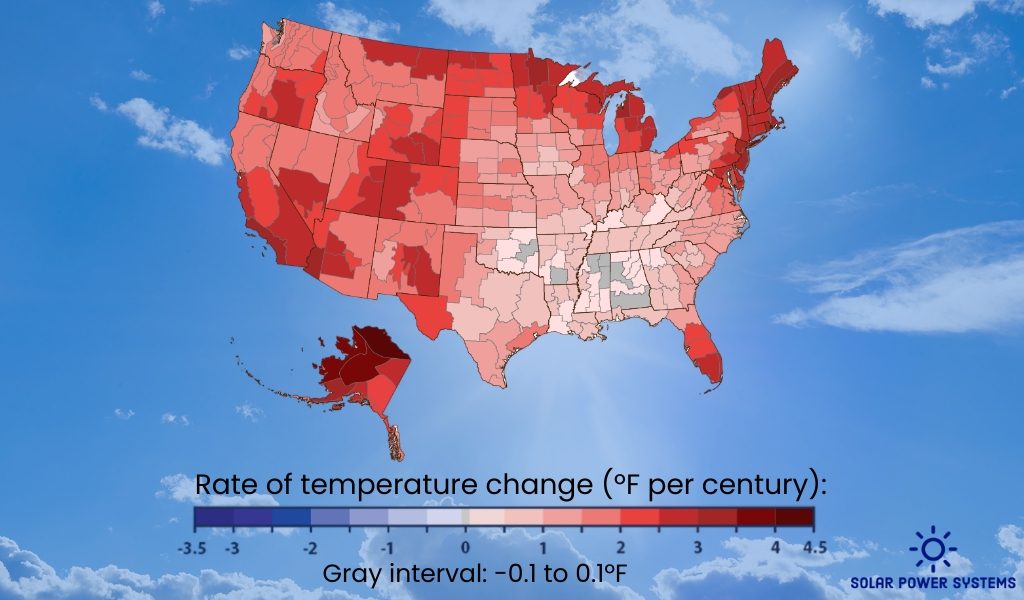
For this reason, many Americans are considering the possibility of powering their air conditioning with solar energy. If you are one of them, and you’ve decided to use solar energy in your household rather than rely on traditional ‘carbon footprint’ sources – the SolarPowerSystems platform is here to help you with the decision!
However, if you’re just considering going green and aren’t sure where to start, check out more articles in our blog on integrating solar power into sustainable living practices or ask for a solar quote from our industry experts, who own information about 2000 US solar installers.
If you’re still considering whether solar panels are the best way to go, here are two factors to consider:
- In 2022, almost 19% of Americans had or planned to install solar panels at home.
- In just 2023, the revenue in the U.S. heating and cooling market exceeded $120 billion.
So, why not take advantage of solar-powered air conditioners and go green with solar panels? Read on to learn more about solar panels and solar-powered air conditioning and discover how to evaluate your capabilities in air conditioning with solar energy.
Solar-Powered Cooling Systems Explained
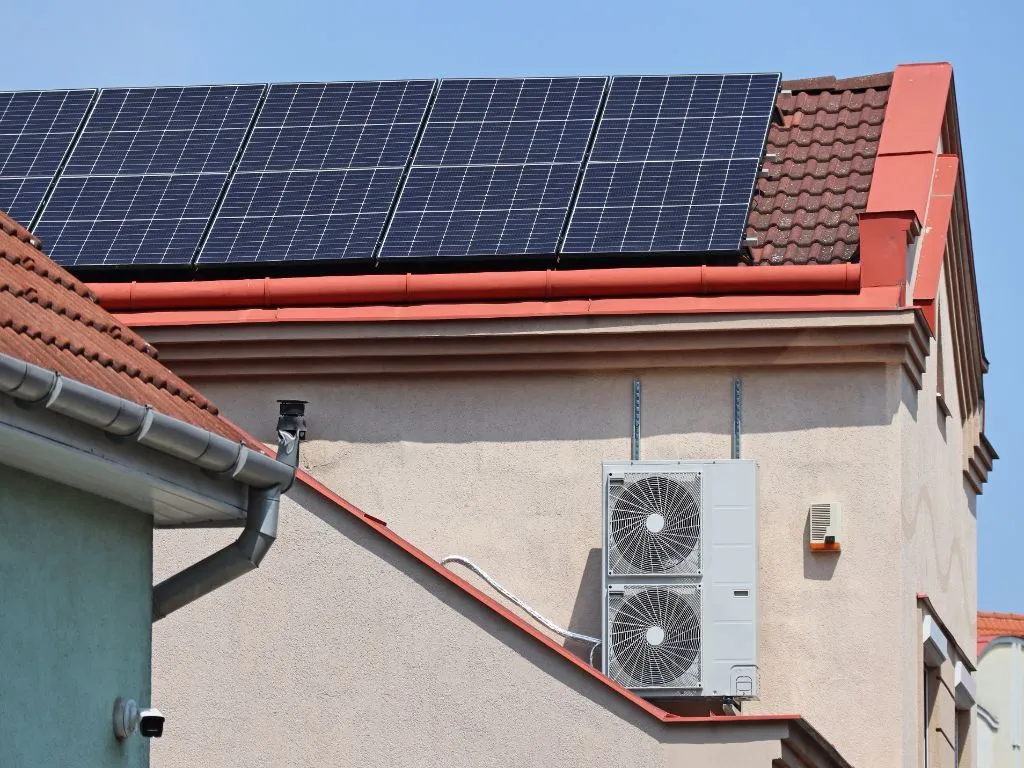
Solar-powered air conditioning is a system using solar panels as an energy source for cooling or heating a space, depending on your needs. The great thing about it is that you can upgrade it anytime and save a lot of money on your AC bill.
The solar-powered air conditioning system consists of three main components:
- Solar panels
- Inverter
- Air conditioner
How do solar-powered AC units work? In reality, there’s nothing complex about it:
- Solar panels generate electricity that goes to the inverter.
- The inverter converts it into alternating current, which is then used to power the air conditioner.
- The solar-powered air conditioner cools the space using electricity from the solar panels.
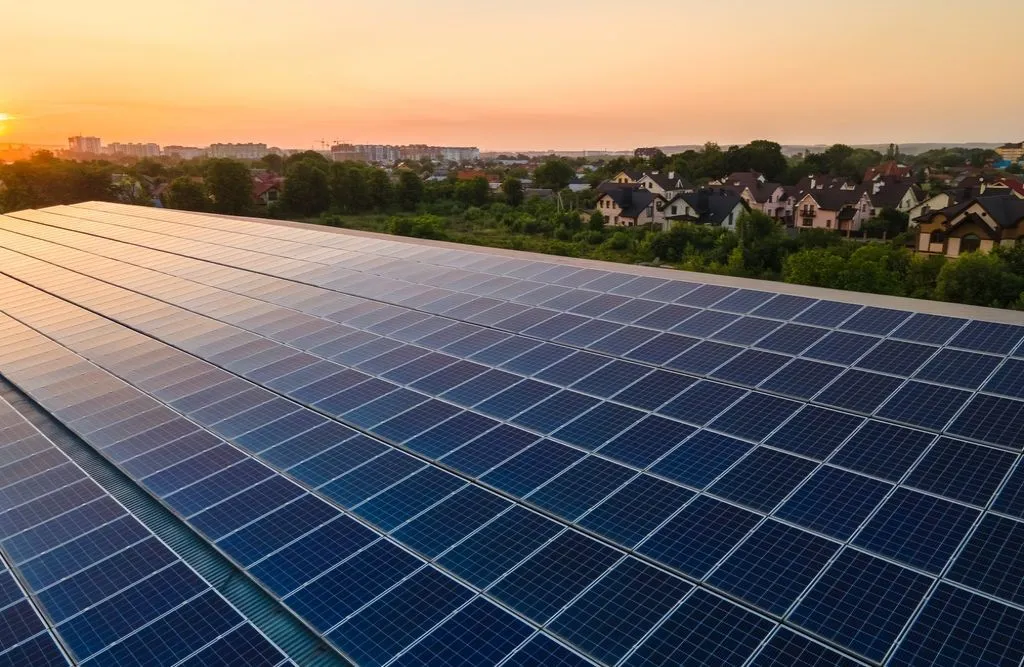
How much is your electricity bill per month?
Help us understand what you`re currently spending
Cycle of Operation of the Solar-Powered Air Conditioner
It’s essential to understand that the air conditioner uses solar energy to heat a liquid, which ultimately allows for cooling or heating the air in the room.
The main stages of solar-powered air conditioning are:
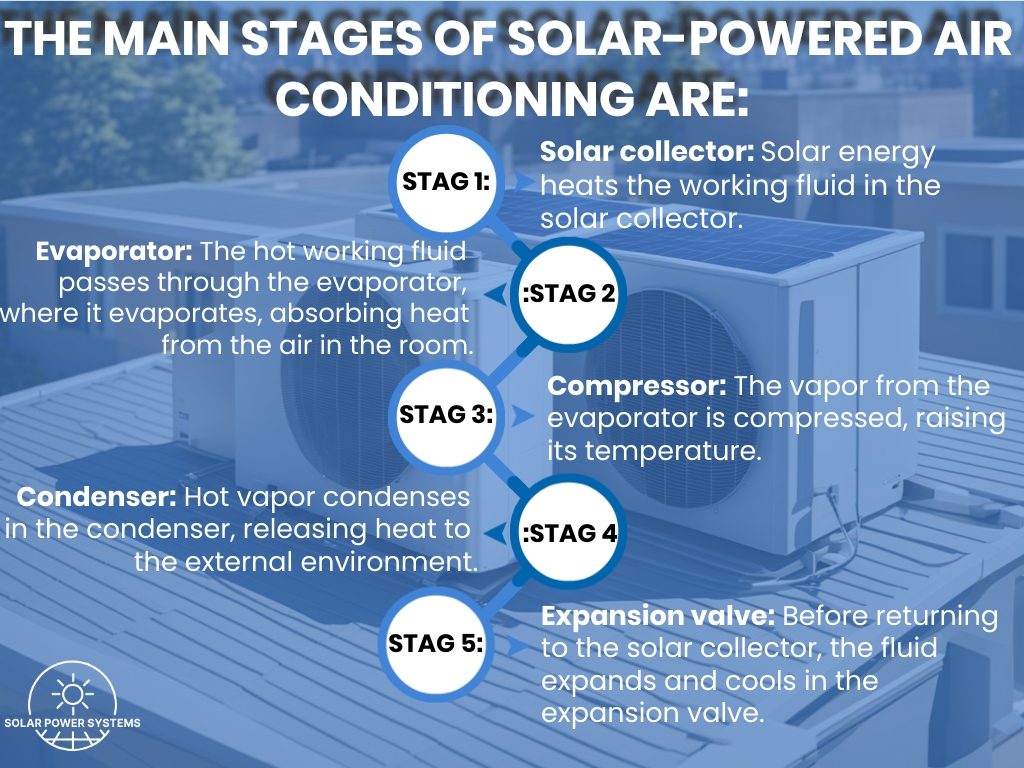
These stages operate continuously throughout the air conditioner’s functioning, with efficiency directly tied to the intensity of sunlight.
What To Consider During Solar Panel Installation
For those who’ve just purchased a house, we recommend installing a solar-powered air conditioner on the roof to save you time and money.
Residents who live in a city with limited sunlight, like Seattle or Portland, consider the purchase and installation of a solar battery. It will store the energy generated by solar panels, providing you with a backup option.
Pros & Cons of Solar-Powered Air Conditioning
A solar-powered air conditioner has distinct advantages compared to conventional ones. By using solar panel for AC, you will:
- Reduce greenhouse gas emissions (e.g., carbon dioxide), as you’ll be using renewable energy.
- Lower electricity costs, as you won’t rely on the general power grid.
- Become independent of the power grid, which is excellent for residents in areas with unreliable electricity.
Of course, along with the benefits, there are some drawbacks of solar-powered air conditioners:
- Higher solar air conditioning prices: If you already have a regular air conditioner, you’ll need to spend extra on updating the solar system components if their capacity is insufficient.
- Uncontrollable solar energy: During cloudy weather or at night, there is no 100% guarantee for the operation of the air conditioner. This may result in intermittent functionality.
However, like any other device, a solar-powered air conditioner is not immune to malfunctions or other issues. Nevertheless, harnessing solar for AC units will benefit not only your family but the entire humanity.
Options for Solar-Powered Air Conditioning
Solar energy is one of the cleanest and most efficient energy sources, while air conditioners are among the most energy-consuming devices in a home, consuming from 3000 to 3500 watts per hour. Therefore, it makes sense to consider combining the advantages and functionality of a solar-powered air conditioner.
Option 1: Battery-Powered DC Air Conditioner
Your solar-powered air conditioner will directly receive energy from the sun, converting it into direct current (DC) through the operation of solar panels.
This is a type of off-grid air conditioning. So, if you live in a remote area with an uninterrupted energy supply, it’s worthwhile to purchase a battery-powered air conditioner that will accumulate solar energy for specific occasions.
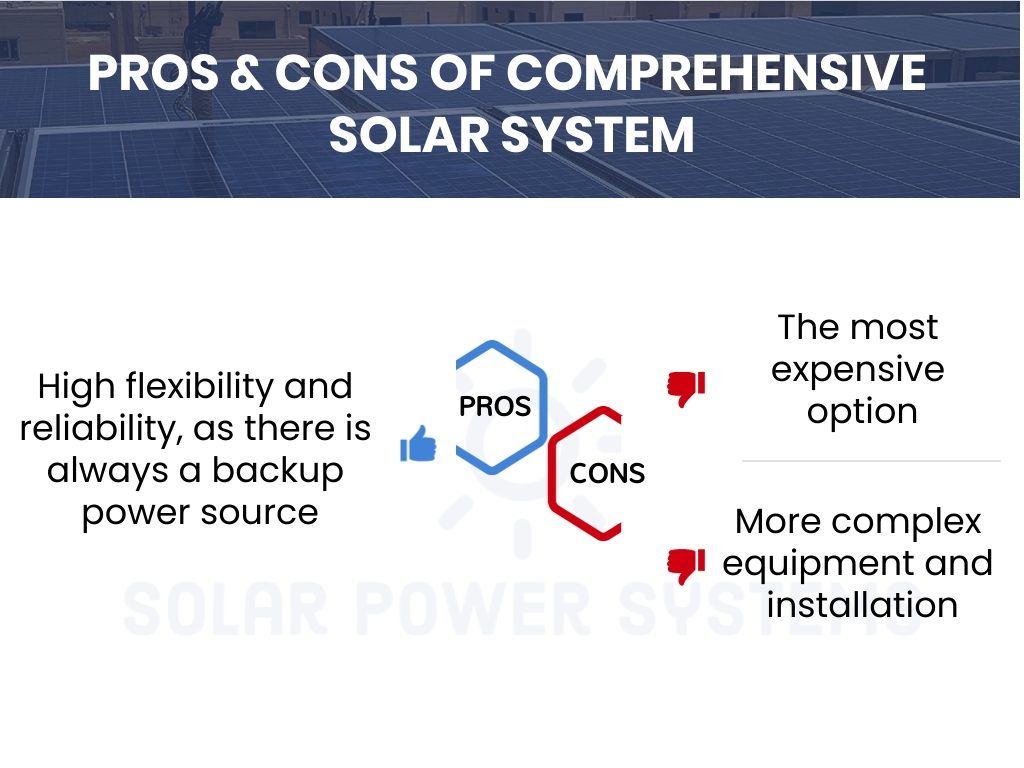
Option 2: Battery-Powered AC Air Conditioner
Are you looking to save on utility bills? Or maybe you’re about conserving natural resources? If that’s the case, then solar panels for AC units are an excellent choice.
In contrast to the first option, the solar-powered air conditioner is powered by alternating current in the usual algorithm. The device receives energy from the sun through an inverter, which converts direct current to alternating current. The latter is used by the air conditioner to cool or heat your home.
Additionally, we recommend paying attention to the AC battery, which will function as an energy storage unit, extending the air conditioner’s operating time in critical situations.
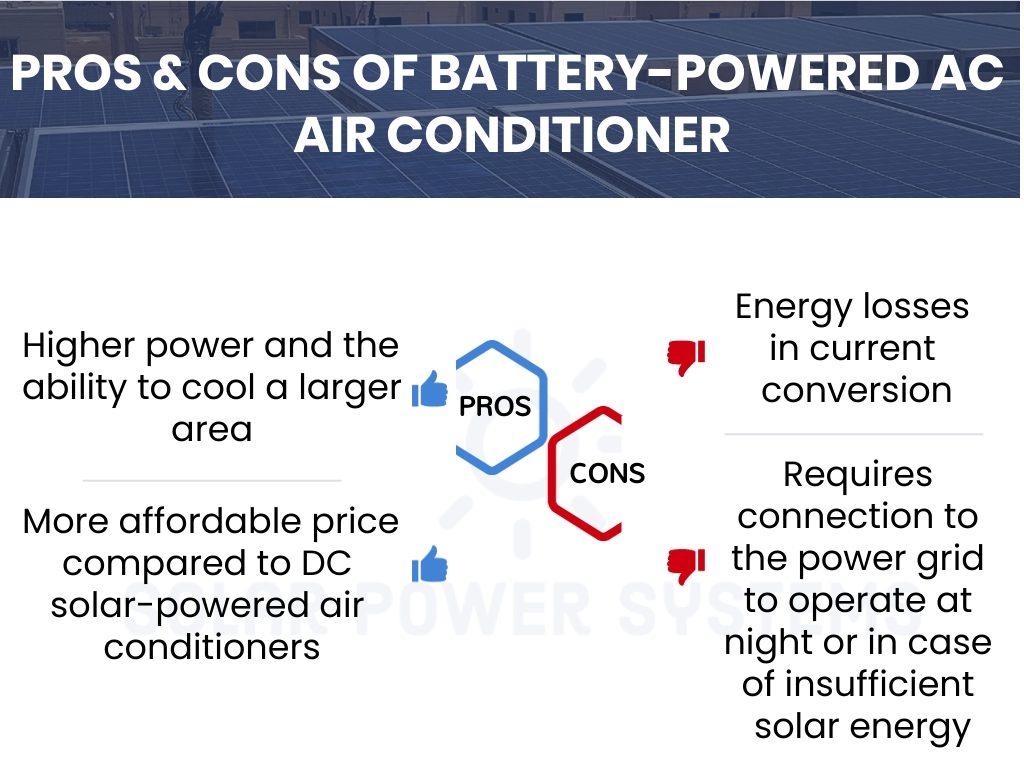
The solar AC unit is the most popular among others. This is because most household appliances (for example, refrigerators, washing machines, microwaves, etc.) operate on alternating current. This is due to the fact that alternating current is easier to transmit over long distances than direct current.
Thereby, consult with experts who can help assess your individual requirements and provide advice on a solar panel for AC units.
Option 3: Comprehensive Solar System
The distinctive feature of these networked solar-powered air conditioning systems is the ability to protect you from power outages due to emergency situations. This is possible through the automatic switching between solar energy and the general power grid. The switch occurs automatically and depends on the availability of sources at that moment.

When making decisions and choosing a solar panel-powered air conditioner, be sure to consider your budget, energy needs, and local climate.
Do I Need a Solar-Powered Air Conditioner?
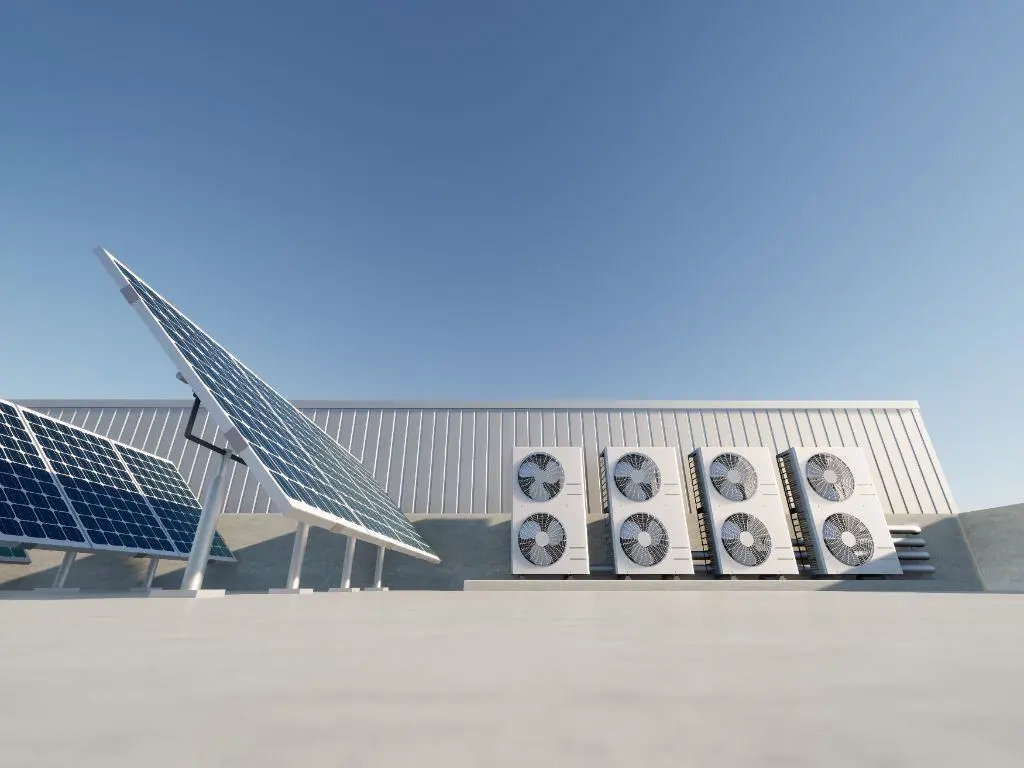
For the effective functioning of a solar-powered air conditioner, certain conditions need to be met:
Sufficient Number of Solar Panels
The number of solar panels should be sufficient to generate the electricity needed to operate the solar-powered air conditioner. The quantity depends on the AC’s power and the amount of daily sunlight reaching the location of the panels.
Proper Installation of Solar Panels
The right installation — angle, direction, shading, and structural soundness — guarantees that your solar panels receive the maximum amount of sunlight. The optimal placement of solar panels is on the south side of your house, and the panels should be installed at an angle of 30–45 degrees relative to the horizon.
Inverter Power
Choosing an inverter with inadequate power won’t produce sufficient alternating current, impacting the solar-powered air conditioner’s performance and efficiency. Ensure the inverter’s power matches or exceeds the AC’s to optimize efficiency and manage electricity costs.
If you live in a state where high air temperatures are frequent, and there is ample sunlight, the performance of a solar-powered air conditioner will be significantly enhanced.
Adhere to the specified conditions to ensure that the money spent on sustainable cooling solutions works to their full potential.
How To Calculate the Number of Solar Panels
Determining the number of solar panels needed to power the air conditioner requires matching the power of the solar panel to the AC’s requirements.
For the calculation, you can use the formula:
Number of panels = Air conditioner power / (Average sunlight × Inverter efficiency)
For example, if the air conditioner has a power of 5 kW, the average sunlight is 5 kW/m²/day, and the inverter efficiency is 90%, then to ensure the air conditioner’s operation, you need 5 kW / (5 kW/m²/day * 0.9) = 10 m² of solar panels.
Important tip: The formula is approximate, as various specific factors in your case, such as the geographical location of your house, cannot be excluded.
Consider additional factors during your calculations:
1. Air Conditioner Power
For instance, if you have a central air conditioner with a power of 3000 W, you will need solar panels that can generate at least 3000 W. Most solar panels for home use can produce between 100 and 415 W. Therefore, you will need thirty 100 W panels or ten 300 W panels to power your air conditioner.
2. Energy Consumption by the Air Conditioner
According to the U.S. Energy Information Administration survey, almost 90% of Americans used air conditioners in 2020. A portable solar-powered air conditioner typically consumes 500 W·hr; an average one – 900 W·hr; a large one – 1440 W·hr. Home air conditioning costs, especially in the summer, can reach up to 3000 W·hr.
3. Air Conditioner Tonnage Rating
This rating determines how much heat an air conditioner can remove in one hour. The higher the rating, the more air volume the air conditioner can cool. For rooms up to 20 m², choose a tonnage rating of 2–3; for 20-40 m² – 3–5; for 40 m² and above – 5–7. Insufficient tonnage rating will result in the air conditioner running continuously, leading to increased electricity costs.
For a more accurate calculation of the number of solar panels for a solar-powered air conditioner, use online calculators available on the websites of many companies specializing in solar systems. Alternatively, seek assistance from a professional installer of solar panels.
Cost of Air Conditioner in 2024
The price of a solar-powered air conditioner ranges from $2000 to $5000. While this is a high cost, it is fully justified as future savings will offset it through reduced utility bills. It is likely that the AC will pay for itself within 10-15 years.
Several factors influence the cost of a solar-powered air conditioner, including:
- Type, size, power, and energy efficiency class of the air conditioner
- Brand reputation of the air conditioner manufacturer
- State where you make the purchase
When exploring options, review offers from various suppliers to align with your needs and budget.
Is Solar-Powered Air Conditioning Truly Effective?
By using solar energy to power the air conditioner, you will significantly save on your family budget, as the cost of solar energy is constantly decreasing.
Solar panels can power both a portable solar-powered air conditioner and larger devices. However, sufficient sunlight and the appropriate power of the solar panel are necessary for this.
Nevertheless, solar-powered air conditioning is a practical reality for your home.
Frequently Asked Questions
Can solar panels truly power an AC unit?
Yes, a solar-powered air conditioning system uses solar energy to generate electricity, powering your air conditioner without relying on the grid.
What is a solar-powered AC?
AC solar panels are one of the latest inventions in the air conditioning industry. These solar panels come with microinverters that convert current. They operate similarly to traditional alternating current systems, but instead of drawing electricity from the grid, they use energy generated from solar panels or water heaters.
Are solar AC units more expensive than traditional ones?
The initial cost of solar power AC units is usually higher than that of conventional ones. However, over time, the free energy from the sun can significantly reduce your electricity bills, potentially offsetting the initial expenses.

